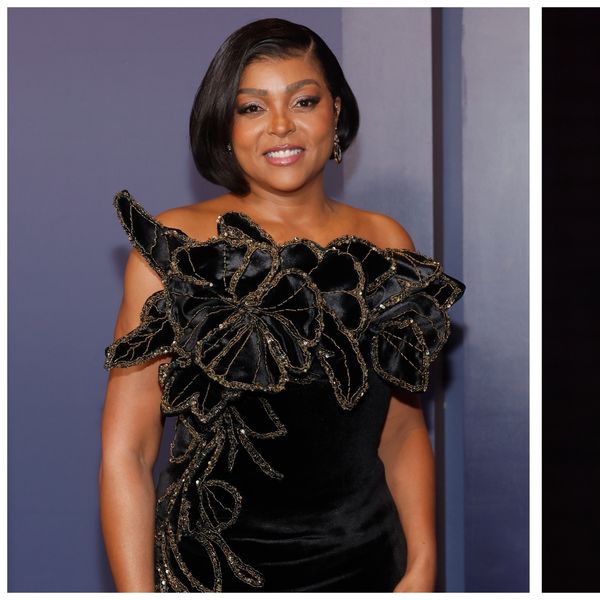
My Ex Ghosting Me Was The Best Thing That Ever Happened To Me
"God told me I took you as far as you could go. Your parents didn't really teach you how to deal with life-situations," he said over the phone, while I cried on my childhood bed. "Now you can go back to living with mommy and daddy."
I was twenty-five years old, had lost my "dream job" and broke the lease on my first "big girl" apartment. I moved back to Houston after living for nearly two years in a small town where I tried to create an independent life from my parents and form a long-term future with my on-and-off again boyfriend of nearly six years.
I was broke and depressed. I didn't eat and I barely slept. My clothes began to fall loose on my figure because I had lost so much weight. My bank account was in the red. My gas tank was on E. My life was like a bad soap opera, but I had created it.
After that last conversation with my boyfriend at the time, I never heard from him again. I kept hope alive because he said he still loved me and saw a future with me; I just needed to get mentally well. Of course, in my fragile state, I took that as a definite sign that he still cared and we would be back together in the future once I worked on myself.
I called multiple times and left several text messages. I even reached out on social media. He subsequently blocked my number and blocked me from all social media channels. I felt like an outcast. To know someone as more than a best friend, to see all aspects of them good and bad and then to become a stranger is the worst type of poison.
I felt that pain in my core and it took me months to cognitively realize that he was doing to me like he did with all of his previous relationships before me; he ghosted me.
With the support of more-than-generous friends and family, I repaired my self-esteem and focused on building my businesses as well as pursuing a Master of Business Administration. I found my zeal for life again. I found my inner confidence and embraced my quirks. I fell in love again with a man that valued me and saw himself building a future with me. I had discovered the secure, vibrant and ambitious girl I knew was hiding within the broken woman.
In the throes of a toxic relationship, you keep yourself above the current. You believe in your soul that no matter what harsh trials are thrown at you, love is still greater than hardship. You are unaware that you are a moment from crashing and being taken under. Once you come to your senses, you realize you were choking on all of the lies and being gaslighted. You realize you could have drowned and never recovered.
In realizing how blessed I was to come out of the other side, here are six things I realized over the course of an almost six-year toxic relationship:
You Can’t Depend on Others for Your Happiness
 Giphy
GiphyMy ex-boyfriend was my first love. I was nineteen, inexperienced and naive. I had never had a boyfriend before and I thought being in a relationship would make me feel complete. I used to envy my friends that got gifts on Valentine's Day and as I got older, I envied their engagement rings. I depended on my ex-boyfriend to make me happy, even as I saw it made him miserable. As he strived to provide happiness for me, it ate away at his own happiness.
We were young and not even sure how we identified ourselves in this vast and often cold world. As a young woman, I searched for examples on how to act and as a young man, he looked to what he knew. I internalized his personal failings with other women and used that to define my worth as a woman. I craved his validation to make me happy. I desired elaborate gifts and fancy dinner dates to prove that I was where his heart lay -- at the cost of my self-esteem. When he ghosted me, I had to deal with my own personal problems. I was forced to make myself happy. I realized how unfair it was to blame him continuously for his misgivings and hold him hostage in a relationship that he obviously did not value.
It Takes Two to Make a Relationship Toxic
 Giphy
GiphyOften times, we try to blame the other person for a toxic relationship. The problem is that it takes two to make a relationship toxic. I was the first to talk to all my girlfriends and paint this vivid picture of how horrible my ex was: how he still communicated with a girl he cheated on me with; acted ashamed of me around his college friends; made fun of my insecurities and body-shamed me. The details I left out are how I would sometimes start arguments over past transgressions; make fun of how he looked and compare him to other men.
I remained in a toxic relationship, even though I had agency over my decisions.
I chose to ignore advice and stick with someone that made me miserable just to say I was in a relationship.
You are Nobody’s Baby Sitter or Mama

I loaned my ex a lot of money while he was a struggling teacher. I gave him $1,400 when his car faced repossession and hundreds of dollars here and there when he was late on rent. I wrote his entire graduate school application and he broke up with me once he got accepted into the program on a full tuition scholarship. I had written so many applications and college essays for him, even his previous Teach for America application, that it felt natural. I didn't realize that I was enabling him to become dependent on me as an on-demand Payday Loan or a muse for his applications. What I realized though is that as he didn't mind bank-rolling my lifestyle throughout college, I didn't mind being that constant ATM for him after college. It made me feel special that he looked to me to help him with his problems. What I should have realized is that sometimes you need to deal with your own problems. Alone.
Self-Care is Vital to Your Mental Well-being
 Giphy
GiphyI didn't focus on making sure that I was mentally well when in the relationship and hid how I felt when around his family. One of his aunts even pointed out that I seemed like I had this dark cloud hanging over me and something was amiss with me. That dark cloud was the relationship and the pressures of balancing life, a career and constant parental feedback. Once I focused on checking in with myself, making sure that I wasn't hiding my problems under a pile of ambition or another relationship, I was able to heal.
Don’t Isolate Yourself from Your Friends and Family

I isolated myself from my friends and family because I knew they did not approve of the relationship. Within the first year of us dating, they pointed out how toxic it was and that he did not value me. My ex-boyfriend even pitted me against my friends by saying that they weren't really my friends and told me about how people at my college made fun of me and that everyone wondered why he would even date me; he was too good for me. He compared me to my friends and even told me that he wished he would have dated one of them because she was so much more mature and that I was a joke, silly and childish.
He crippled my self-esteem to the point where I hated leaving my college dorm because I was scared people were making fun of the way I dressed, talked or even walked. He became my world and I looked to him for validation. When he ghosted me, I realized that my friends were still there and my parents helped with my transition back home. Once he paid me back the money I loaned him, he was nowhere to be found. All along I wish I would have realized my friends and family did care for me and wanted to see me happy.
Exiting a Toxic Relationship Before You are Ghosted is Essential
 Giphy
GiphyIf you are being ghosted, you have missed all of the signs that the relationship is not working out and that it is toxic. There were numerous signs that he had tired of the relationship, from our multiple break-ups and make-ups to his continuous comparing of me to other women and the feeling of isolation even within the relationship. When I was a friend, I had seen how he treated a previous ex so coldly by ignoring their calls and acting like they didn't even exist. For some reason, when I witnessed these actions as his friend, it did not click that maybe he was the problem and not the other people. In my naivete, I believed that there was something wrong with them, that they were insane or could not provide him what he needed in a healthy relationship.
I believed that I could be that answer because I was his friend first.
What I realized is that he was a master of lies. He made himself look like the victim, while he was leaving the real victims broken. I am so glad I escaped that personal hell before I ended up in an even worse situation. I sought therapy to deal with this relationship and I am so glad he ended it the way he did. It gave me the chance to see my own major faults and realize that I am the master of my own happiness. People treat you the way you allow them to treat you. I will never again give a man that much power.
Featured image by Getty Images
- Can You Be Friends With An Ex In A New Relationship? - xoNecole: Women's Interest, Love, Wellness, Beauty ›
- The Truth About Life After A Toxic Lover - xoNecole: Women's Interest, Love, Wellness, Beauty ›
- Why Can't I Get Over Someone I Barely Dated? - xoNecole: Women's Interest, Love, Wellness, Beauty ›
- Texts To Send Someone Instead Of Ghosting Them - xoNecole: Lifestyle, Culture, Love, & Wellness ›
- Telling Signs That You're Dating A Serial Ghoster - xoNecole ›
- 'Ghosted' by my ex. After four years I never heard from him again ... ›
- Exes Explain Ghosting, the Ultimate Silent Treatment - The New ... ›
- Ask Polly: 'My Boyfriend of Three Years Just Ghosted Me!' ›
- How To Get Over Being Ghosted In A Long-Term Relationship ›
- Why Ghosting Hurts So Much | Psychology Today ›
ItGirl 100 Honors Black Women Who Create Culture & Put On For Their Cities
As they say, create the change you want to see in this world, besties. That’s why xoNecole linked up with Hyundai for the inaugural ItGirl 100 List, a celebration of 100 Genzennial women who aren’t afraid to pull up their own seats to the table. Across regions and industries, these women embody the essence of discovering self-value through purpose, honey! They're fierce, they’re ultra-creative, and we know they make their cities proud.
VIEW THE FULL ITGIRL 100 LIST HERE.
Don’t forget to also check out the ItGirl Directory, featuring 50 Black-woman-owned marketing and branding agencies, photographers and videographers, publicists, and more.
THE ITGIRL MEMO

I. An ItGirl puts on for her city and masters her self-worth through purpose.
II. An ItGirl celebrates all the things that make her unique.
III. An ItGirl empowers others to become the best versions of themselves.
IV. An ItGirl leads by example, inspiring others through her actions and integrity.
V. An ItGirl paves the way for authenticity and diversity in all aspects of life.
VI. An ItGirl uses the power of her voice to advocate for positive change in the world.
Let’s make things inbox official! Sign up for the xoNecole newsletter for daily love, wellness, career, and exclusive content delivered straight to your inbox.
You've Never Seen Luke James In A Role Quite Like This
Over the years, we've watched Luke James play countless characters we'd deem sex symbols, movie stars, and even his complicated character in Lena Waithe's The Chi. For the first time in his career, the New Orleans-born actor has taken on a role where his signature good looks take a backseat as he transforms into Edmund in Them: The Scare—a mentally deranged character in the second installment of the horror anthology series that you won't be able to take your eyes off.
Trust us, Edmund will literally make you do a double take.
xoNecole sat down with Luke James to talk about his latest series and all the complexity surrounding it—from the challenges taking on this out-of-the-box role to the show's depiction of the perplexing history of the relationship between Black Americans and police. When describing the opportunity to bring Edmund's character to life, Luke was overjoyed to show the audience yet another level of his masterful acting talents.
"It was like bathing in the sun," he said. "I was like, thank you! Another opportunity for me to be great—for me to expand my territory. I'm just elated to be a part of it and to see myself in a different light, something I didn't think I could do." He continued, "There are parts of you that says, 'Go for it because this is what you do.' But then also that's why it's a challenge because you're like, 'um, I don't know if I'm as free as I need to be to be able to do this.' Little Marvin just created such a safe space for me to be able to do this, and I'm grateful for everything I've been able to do to lead to this."

Them: The Scare, like the first season, shines a light on the plight of Black Americans in the United States. This time, the story is taking place in the 1990s, at the height of the Rodney King riots in Los Angeles. While the series presents many underlying themes, one that stands out is Black people and the complicated relationship with the police. "For the audience, I think it sets the tone for the era that we're in and the amount of chaos that's in the air in Los Angeles and around the country from this heinous incident. And I say it just sets the tone of the anxiety and anxiousness that everybody is feeling in their own households."
James has been a longtime advocate against police brutality himself. He has even featured Elijah McClain, the 23-year-old Colorado man who died after being forcibly detained by officers, as his Instagram avatar for the past five years. So, as you can imagine, this script was close to his heart. "Elijah was a soft-loving oddball. Different than anyone but loving and a musical genius. He was just open and wanted to be loved and seen."

Luke continued, "His life was taken from him. I resonate with his spirit and his words...through all the struggle and the pain he still found it in him to say, 'I love you and I forgive you.' And that's who we are as people—to our own detriment sometimes. He's someone I don't want people to forget. I have yet to remove his face from my world because I have yet to let go of his voice, let go of that being [because] there's so many people we have lost in our history that so often get forgotten."
He concluded, "I think that's the importance of such artwork that moves us to think and talk about it. Yes, it's entertaining. We get to come together and be spooked together. But then we come together and we think, 'Damn, Edmund needed someone to talk to. Edmund needed help... a lot [of] things could have been different. Edmund could have been saved.'
Check out the full interview below.
Luke James Talks Ditching Sex Symbol Status For "Them: The Scare", Elijah McClain, & Morewww.youtube.com
Featured image by Getty Images










